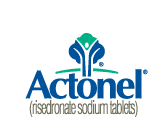SAN DIEGO -- Men and women older than 65 who started bisphosphonate therapy with alendronate had about a 1.5-fold greater risk for gastrointestinal events after 4 months, compared with those who started therapy with risedronate, results from a large retrospective study suggest.
In a related study, GI-related medical costs were nearly three times higher in patients who started therapy with alendronate (Fosamax) than in those who started with risedronate (Actonel), Joseph Doyle, a pharmacist, said in a poster session during the annual meeting of the American Association of Clinical Endocrinologists.
But Dr. Anastasia Daifotis told this newspaper that such studies are "extremely misleading" because they are not head-to-head randomized trials. "These are not real head-to-head comparisons," said Dr. Daifotis, who directs the Fosamax clinical trials for Merck, manufacturer of Fosamax.
Dr. Daifotis also said that the findings contradict results of the longest head-to-head randomized, placebo-controlled trial of alendronate and risedronate, which will be published soon.
For the first study, Mr. Doyle and his associates gathered data from a pharmaceutical claims database licensed by Protocare Sciences, a health care consulting service.
They conducted a retrospective analysis of 3,947 men and women aged 65 and older who were given a prescription for bisphosphonate therapy between November 2000 and August 2001.
Patients who received a prescription for risedronate (5 mg/day) or alendronate (5 mg/day, 10 mg/day, 35 mg/wk, or 70 mg/wk) were selected for analysis. Those who were prescribed a bisphosphonate during the prior 6 months were excluded.
ICD-9 diagnostic codes were used to assess the occurrence of GI events 6 months preceding the prescription and during the 4-month follow-up period, said Mr. Doyle, senior manager for health economics and outcomes research for Aventis Pharmaceuticals, manufacturer of Actonel.
Patients who took daily alendronate regimens were 57% more likely than those on risedronate to experience a GI event in the first 4 months after initiating therapy. Patients who took weekly alendronate regimens, meanwhile, were 66% more likely than those on risedronate to experience a GI event in the first 4 months.
In addition, patients who started therapy with risedronate were 23% more likely than patients on daily alendronate and 15% more likely than patients on weekly alendronate to have had a history of GI diagnoses before the initiation of treatment.
"This suggests a possible preference for prescribing risedronate among high-risk GI patients," Mr. Doyle said.
The findings run counter to results of the longest head-to-head randomized, placebo-controlled trial of alendronate and risedronate, which are slated to appear in Current Medical Research and Opinion, Dr. Daifotis said.
The 1-year, multicenter study of 549 patients found no difference in the prevalence of GI events: 27% in the placebo group, 28% in the risedronate group, and 28% in the alendronate group. "They're pretty comparable," she said.
In the second study presented at the meeting, Mr. Doyle and his associates used the same database to evaluate direct medical costs of GI-related events, including outpatient visits, hospitalization, and prescriptions for gastroprotective agents.
The average monthly per-patient cost for GI-related medical treatment was $2.52 for risedronate, $7.40 for alendronate daily, and $7.50 for alendronate weekly, he said.
"The alendronate patient costs were three times greater than [those of] the risedronate patients, irrespective of whether patients received daily or weekly alendronate," Mr. Doyle said. Inpatient care was the main reason for the difference, he added.
For her part, Dr. Daifotis dismissed the value of the study.
It "tells you nothing about how they made sure that the treatment groups had the same patient characteristics," she said. "If you end up with all of your alendronate patients being sicker then I would not be surprised if they were hospitalized more or that their [medical] costs were greater."
The studies were funded by the Alliance for Better Bone Health, a partnership between Procter & Gamble and Aventis.
Doug Brunk
San Diego Bureau
COPYRIGHT 2003 International Medical News Group
COPYRIGHT 2003 Gale Group



